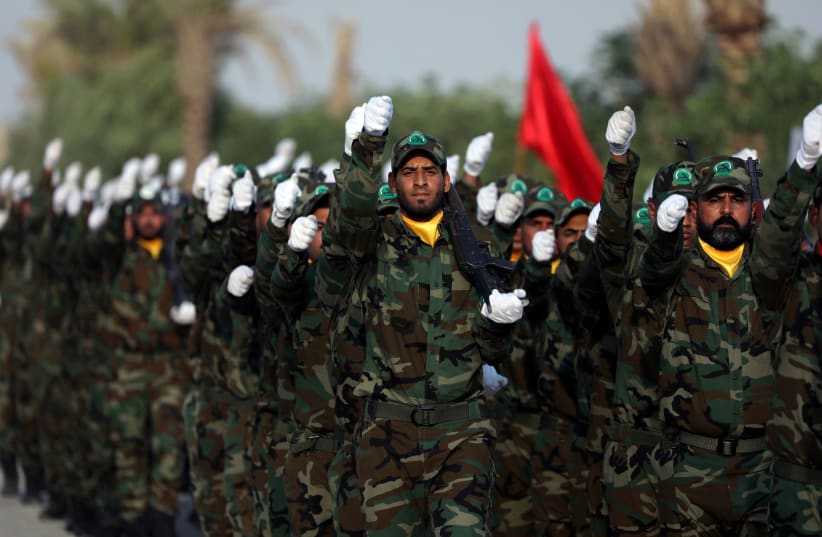Interruptions caused by the virus, including border closings to prevent the spread of the disease, have drastically cut Tehran’s cash supplies to the militia groups in recent months, said three Iraqi paramilitary group commanders and a regional official familiar with Iran’s activities in Iraq. The funds from Iran are typically allocated for military operations related to the paramilitary groups’ activities such as fighting Iran’s opponents, including attacks against US targets, the three commanders said.
Since the coronavirus hit earlier this year, Iran has reduced its monthly payments to each of the four top militia groups in Iraq to between $2 million and $3 million from $4.5 million to $5 million, said one of the commanders, who belongs to a powerful paramilitary group. The reduced funding has impacted operations of the militia groups and is forcing them to seek alternative sources of funding for military operations and weapons such as from their own business interests, the commanders said.
Iraq shares a border with Iran, a coronavirus epicenter in the Middle East with more than 11,000 reported deaths, according to a Reuters tally.
Disruptions brought on by the pandemic come on top of a squeeze on Tehran’s financing of the paramilitary groups over the past two years caused by US sanctions on Iran, said the three commanders and the regional official. The regional official said Tehran’s funding of the groups has dropped by millions of dollars. The sanctions combined with the coronavirus crisis and a decline in oil prices have helped force Iran, which faces a large budget deficit, to limit its military spending including on the Revolutionary Guards.
Iran’s linking of its paramilitary proxies in a Shi’ite axis of power across Iraq and through Syria to the Mediterranean, has been crucial to its strategy of countering US influence as it has come under pressure from sanctions.
US special representative for Iran Brian Hook agreed that US sanctions were having an impact on Iran’s funding of paramilitary groups, saying it was "further evidence that our campaign of maximum pressure is successfully depriving the (Iranian) regime of revenue to fund its terror proxies and other destabilizing actions across the region." He did not discuss the degree of the impact.
The squeeze on militia financing also follows the killing of Iranian Maj.-Gen. Qassem Soleimani, who died in a US drone strike in Baghdad in January. The loss of the senior military commander, who created an Iran-aligned axis of influence across the Middle East and steered political allies in Iraq, has dealt a blow to the operations of paramilitary groups and Iran’s broader aims in Iraq, according to the three commanders as well as the regional official and a senior Iranian diplomat.
The Iran-backed paramilitary groups helped the Iraqi government defeat Islamic State in 2017. They have dominated the Popular Mobilization Forces (PMF), an Iraqi state-controlled institution that is an umbrella grouping of militias, including and smaller Shi’ite groups that object to Iranian dominance. The PMF was formally integrated into Iraq’s armed forces and has led many security operations.
A PMF spokesman, Muhannad al-Aqabi, declined to comment on any issues to do with groups backed directly by Iran. The PMF receives funding and equipment through official channels via the Iraqi state, even if the ultimate source of the money is often Iran, Aqabi said.
A spokesman at the public relations office of Iran’s elite security force, the Islamic Revolutionary Guards Corps, or IRGC, denied that Iran finances the militias. “The Islamic Republic has always supported the oppressed people in the region and beyond and our policy has not changed. But we do not provide financial support to those who fight against America’s hegemony in our region.”
When asked by Reuters whether Iran’s financial and military support of Iraqi paramilitaries had declined, Alireza Miryousefi, a spokesman for Iran’s mission to the United Nations in New York, said: “These rumors are designed to sow discord between the two nations and are doomed to fail.” He added that Iran is “fully supportive” of the Iraqi government and that the two countries “engage closely in all matters of mutual interest” but that Iran doesn’t interfere in its neighbor's internal affairs.
A spokesman for the Iraqi prime minister’s office wasn’t immediately available for comment. Other Iraqi government officials couldn’t be reached or didn’t respond to requests for comment.
Tehran has long seen its paramilitary partners as a way of exerting its presence in Iraq and countering the influence of Washington, a critical ally for Baghdad.
US President Donald Trump started to re-impose sanctions in 2018, including measures targeting the Revolutionary Guards, in an attempt to curb Tehran’s missile and nuclear programs and diminish the Islamic Republic’s influence in the Middle East. Iran has said the US sanctions are illegal and hurt the Iranian people.
Prior to the US re-imposing sanctions, Tehran was sending $12 million to $15 million a month to its militia allies in Iraq, a major OPEC oil producer and one of the United States’ most important allies in the Middle East, said the commander and another member of a powerful militia.
In addition to interruptions to funding from Iran, the three paramilitary commanders said border closures and the pandemic had reduced the flow of other types of support, including ammunition and training for Iraqi fighters sent to Syria to support President Bashar Assad in the multi-sided conflict.The training, said the second commander, included street fighting, the use of anti-armor rockets, and the use of drones to triangulate enemy positions. That has all stopped, he said.
